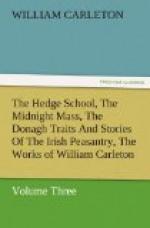Barney.—“I want to go out, if you plase, sir.”
“Go, avick, you’ll be a good scholar yet, Barney. Faith, Barney knows whin to laugh, any how.”
“Well, Larry, you can’t spell Ephabridotas?—thin, here’s a short weeshy one, and whoever spells it will get the pins;—spell a red rogue wid three letters. You, Micky! Dan? Jack? Natty? Alick? Andy? Pettier? Jim? Tim? Pat? Body? you? you? you? Now, boys, I’ll hould you that my little Andy here, that’s only beginning the Rational Spelling Book, bates you all; come here, Andy, alanna: now, boys, If he bates you, you ’must all bring him a little miscaun of butter between two kale leaves, in the mornin’, for himself; here, Andy avourneen, spell red rogue with three letthers.”
Andy.—“M, a, t—Mat.”
“No, no, avick, that’s myself, Andy; it’s red rogue, Andy—hem!—F—.”
“F, o, x—fox.”
“That’s a man, Andy. Now boys, mind what you owe Andy in the mornin, God, won’t yez?”
“Yes, sir.”
“Yes, sir.”
“Yes, sir.”
“I will, sir.”
“And I will, sir.”
“And so will I sir,” etc., etc, etc
I know not whether the Commissioners of Education found the monitorial system of instruction in such of the old hedge schools as maintained an obstinate resistance to the innovations of modern plans. That Bell and Lancaster deserve much credit for applying and extending the principle (speaking without any reference to its merits) I do not hesitate to grant; but it is unquestionably true, that the principle was reduced to practice in Irish hedge schools long before either of these worthy gentlemen were in existence. I do not, indeed, at present remember whether or not they claim it as a discovery, or simply as an adaptation of a practice which experience, in accidental cases, had found useful, and which they considered capable of more extensive benefit. I remember many instances, however, in which it was applied—and applied, in my opinion, though not as a permanent system, yet more judiciously than it is at present. I think it a mistake to suppose that silence, among a number of children in school, is conducive to the improvement either of health or intellect, that the chest and the lungs are benefited by giving full play to the voice, I think will not be disputed; and that a child is capable of more intense study and abstraction in the din of a school-room, than in partial silence (if I may be permitted the word), is a fact, which I think any rational observation would establish. There is something cheering and cheerful in the noise of friendly voices about us—it is a restraint taken off the mind, and it will run the lighter for it—it produces more excitement, and puts the intellect in a better frame for study. The obligation to silence, though it may give the master more ease, imposes a new moral duty upon the chil—the sense of which must necessarily weaken his application.




